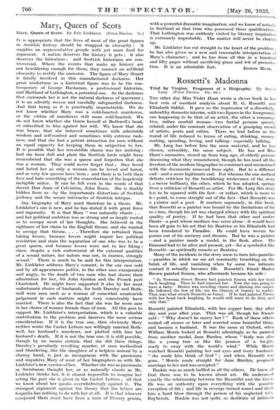Mary, Queen of Scots .
Mary, Queen of Scots. By Erie Linklater. (Peter Davies. 6s.)
IT is appropriate that the lives of most of the great figures in Scottish history should be wrapped in obscurity : it supplies an argumentative . people with set more food for argument. A nation deserves the history it gets ; it also deserves the historians : and Scottish historians are con- troversial. Where the events that make up history are not bewildering enough for them, they concoct an artificial obscurity to rectify the omission. The figure of Mary Stuart is fatally involved in this manufactured darkness. Her great misfortune as a historical figure was to be the con- temporary of George Buchanan, a professional historian, and Maitland of Lethington, a potential. one. So the darkness that surrounds her is not the natural darkness of ignorance ; it is an adroitly woven and carefully safeguarded darkness. And that being so it is practically impenetrable. We do not know whether Mary was a cold-hearted murderess, or the victim of murderers still more cold-hearted. We do not know whether she threw herself at Bothwell's head, or submitted to . him against her will. We know that she was brave, that she behaved sometimes with admirable wisdom and self-control and sometimes with extreme rash- ness, and that she had a potent attraction for men without an equal capacity for keeping them in subjection to her. It is possible that her irresistible charm was her undoing : had she been dull and plain the Scottish lords might have remembered that she was a queen and forgotten that she was a woman. They could never forget that ; they loved and hated her as only a woman can be loved and hated, and as very few queens have been ; and there is in both their love and hate something of the exacerbation of the hopelessly ineligible suitor. It can be felt even in the words of that decent Don Juan of Calvinism, John Knox. She is doubly hidden from us—by the importunate distortions of Scottish jealousy and the secure intricacies of Scottish intrigue.
Any biography of Mary must therefore be a thesis. Mr. Linklater's one is new, and he has stated it with great force and ingenuity. It is that Mary " was naturally chaste - . and her political ambition was so strong and so deeply rooted as to occupy most of her thoughts. She believed in the rightness of her claim to the English throne, and she wanted to occupy that throne. . . . Therefore she refrained from taking lovers, because lovers might impair her political resolution and stain the reputation of one who was to be a great queen, and because lovers were not to her liking : since, despite a rich endowment of the external qualities of a sexual nature, her nature was not, in, essence, strongly sexual." There is much to be said for this interpretation. Mr. Linklater adduces Mary's consent, in the one case cold and by all appearances politic, in the other case exasperated and angry, to the death of two men who had shown their admiration for her, Sir John Gordon and the French poet Chastelard. He might have supported it also by her most unfortunate choice of husbands, for both Darnley and Both- were men such as a woman of somewhat amateurish judgement in such matters might very conceivably have married. There is also the fact that she was far more sure in her choice of women friends than of men. All this goes to- support Mr. Linklater's interpretation,- which is a valuable contribution to the problem and deserves the most serious. consideration. If it is the true one, then obviously Mary neither wrote the Casket Letters nor willingly married.Both- well, her husband's murderer, nor plotted with him her huSband's death. If it is not the true one, it is still possible, though by no means certain, that she did these things., Darnley's peculiarly revolting murder, at once methodical and blundering, like the slaughter of a helpless animal by a clumsy .hand, is just as incongruous with the passionate and impulsive ,Mary of most of her biographers as with Mr. Linkiater's new version of her. Whether she was as passionate as Swinburne thought her, or as naturally chaste as Mr." Linklater. thinks her, it is almost impossible to imagine her_ acting the part she is given in the Casket Letters ; all that we know about her speaks overwhelmingly against it. The strongest argument against the theory that the letters are_ forgeries has nothing to do with her at all. It is that whoever composed -thein Must have been man- of literary genius,' with a-powerful dramatic imagination, and we know of nobody in Scotland at that time who possessed those qualifications. That Lethington was suddenly visited by literary inspiration is extremely improbable. The matter wily never be cleared up.
Mr. Linklater has cut straight to the heart of the problem : he has also given us a new and reasonable interpretation of Mary's character.; and he has done all this in a hundred and fifty pages without sacrificing grace and wit of presenta-
















































 Previous page
Previous page